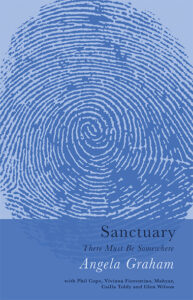Kaja Brown reviews the collection of poems Sanctuary – There Must Be Somewhere, and looks at how it resonates with today’s society.
With the UK government’s controversial Rwanda deportation scheme and the recently proposed Illegal Migration Bill which critics warn will “create significant obstacles, penalties and harms to people seeking asylum in the UK”, the idea of sanctuary seems acutely pertinent. This issue is especially controversial in Wales, since the Welsh government has declared Cymru to be a Nation of Sanctuary and has expressed its disagreement with the UK government’s stance. With this in mind, this makes Angela Graham’s new poetry collection Sanctuary – There Must Be Somewhere a topical read. The title alone sounds like a plea to humanity and hints at what is to come.
This is a collaborative collection of poetry by writers living in Wales or Ireland about the many meanings of sanctuary and how it manifests. Angela Graham is the writer of most of the poems in the book, however she has also commissioned poems from writers who have experienced displacement, migration, activists, experts on holy places, and asked them to work together to make this a sanctuary for their poetry. This has resulted in a book of poems that range from beautiful to harrowing, and sometimes both at the same time. There are recurrent threads that run through the book, and yet each poet’s voice shines through and offers a highly personal lens on each topic.
The term ‘refugee’ is often used negatively in modern media, and the poets in this book seek to dispel this.
The collection begins with a series of poems about the war between Russia and the Ukraine. ‘Since the Evacuations from Kabul’ looks at seeking refuge in a world that doesn’t treat refugees well. The poem laments: ‘Is there a scathing truth we have to face,/ that outside every sanctuary there’s a hell’… ‘Prison cell and sanctuary – keys turn, locks, clicks, bolts slide/ but only one can open from inside’. The imagery of ‘hell’ and ‘prison’ in this poem may sound hyperbolic, but it isn’t far from the words asylum seekers use to describe UK detention centres. In a letter to the charity Choose Love, an asylum seeker recounted his own experience in the inhumane ex-army base detention centre Napier Barracks in the following words: ‘Apart from the effect on their physical health, vulnerable people who fled war and persecution had to bear the prison-like atmosphere of the camp.’ Prison, hell: the barracks couldn’t be further from a safe sanctuary, and this poem leads the reader to wonder how asylum seekers are treated by putting you in their shoes.
The term ‘refugee’ is often used negatively in modern media, and the poets in this book seek to dispel this. In the introduction, Northern Irish poet Glen Wilson writes that ‘The treatment of refugees in the media made them appear to be aberrations, inherently different, whereas it seemed to me in my poem that dealing with familial issues would portray refugees as more than two dimensional.’ His poem, ‘Border Crossing, Reynosa to Hidalgo’ is a thoughtful look at the experience of someone being interrogated by border control. The poem exposes the cold attitudes of the security staff: ‘Looking for clues to my genesis they have learned my language/ for interrogation not exploration, and they do not enjoy the rolled rr sounds/ as they lose momentum through repetition with their mouths.’ The narrator proceeds to reminisce about their childhood and wonder if they ‘disappoint their mother’ for losing their hopes and dreams when faced with the reality of a dispassionate world. Reading this poem, you find yourself feeling sympathetic to their situation and wishing for them that they were treated with the gentleness they long for.
Innovative. Informed. Independent.
Your support can help us make Wales better.
The poem ‘Consider’ explores similar themes, opening with the question: ‘Why do you still call me ‘refugee’?/ Do you want me to be forever fleeing?’ The poem considers the ache of being othered in a country you are trying to call home, and what it is like to be made to feel like you don’t belong: ‘I was a refugee. Now I am here/ where I have to do so much explaining,/ where I have to live so much on your terms/ and I am growing this second heart/ as bravely as I can.’ The imagery of the second heart implores the reader to empathise with what it is like holding these identities within yourself while trying to find a sanctuary that you can fit into.
This encapsulates what the poets who contributed to this collection try to endorse in many different ways: that humanity’s compassion creates sanctuary, and the lack thereof creates hell.
The collection also explores other meanings of sanctuary: within the body, family, God and holy spaces. Many poems consider whether any space is sacrosanct anymore. ‘Three Stones’ is a poem by Angela Graham herself that reacts to the photographs of lichen growing on stone in the Welsh Garw Valley. ‘Three stones, half-sunk in Cwm Garw sod:/ a perfect triangle, two suns,/ in white, in black – Here is your God.’ The poem relates nature with God and the body, in a holy trinity, taking us back to a time where people found sanctuary and the divine within the natural world.
Descriptions of nature permeate multiple poems, adding to the collection’s exploration of the urgency of sanctuary due to living ‘on an imperilled planet’. Phil Cope’s ‘Another Lake, Another Land’ is a long narrative poem that uses descriptions of sea birds on cliffs to explore the idea of animal spirituality and human interference with it: ‘The birds become the air,/ preaching gospel of the glide’. The poem shifts from the birds on the cliffs, to the narrator making their ‘way to India’ on a spiritual journey, to recounting a tale of a childhood friend, Billy, who snatched sea bird’s eggs, and when told to replace them by his mother, fell and died: ‘But one missed hold,/ one single loosened finger and he’s falling to the rocks’ sharp rest below’. The poem appears in some ways mismatched, and certainly the middle stanza on the journey to India can feel out of place when considering the rest of the poem is situated in Wales. However, all of the stanzas are linked by the consideration of humankind’s place and the contemplation of life’s meaning. It is the descriptions of nature that make this poem particularly beautiful and harrowing: ‘far off, above Mynydd Llangeinor,/ safe for the moment from/ more human interference,/ two birds rearranged/ the atoms of the air.’ The verses seem to suggest that people should leave nature alone and treat it with the reverence it deserves.
 The collection ends with a hopeful poem called ‘Home’ which concludes that ‘We are a home for one another./ And this holds true for everyone.’ This encapsulates what the poets who contributed to this collection try to endorse in many different ways: that humanity’s compassion creates sanctuary, and the lack thereof creates hell. This is certainly an idea worth considering when it comes to today’s treatment of immigrants and refugees, and the role of governments and citizens in making Wales, Northern Ireland and England a more welcoming place. If you want to explore sanctuary, identity and belonging, then this collection is a good place to start.
The collection ends with a hopeful poem called ‘Home’ which concludes that ‘We are a home for one another./ And this holds true for everyone.’ This encapsulates what the poets who contributed to this collection try to endorse in many different ways: that humanity’s compassion creates sanctuary, and the lack thereof creates hell. This is certainly an idea worth considering when it comes to today’s treatment of immigrants and refugees, and the role of governments and citizens in making Wales, Northern Ireland and England a more welcoming place. If you want to explore sanctuary, identity and belonging, then this collection is a good place to start.
Sanctuary: There must be somewhere (2022) by Angela Graham
This review was written by Kaja Brown thanks to the Books Council of Wales’ New Audiences Fund.
All articles published on the welsh agenda are subject to IWA’s disclaimer. If you want to support our work tackling Wales’ key challenges, consider becoming a member.




